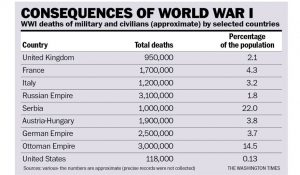April 6 marks the 100th anniversary of the U.S. entry into World War I — a war that claimed the lives of about 38 million people. It is correctly known as the “war about nothing,” so why was it fought? The United States entered the war near the end, after much of Europe had been bled into exhaustion. Relatively speaking, U.S. deaths were few, about 118,000 from all causes, but a great tragedy for each of the families that suffered a loss (see enclosed chart).
The war began after the assassination of Archduke Franz Ferdinand of Austria by Yugoslav nationalist Gavrilo Princip in Sarajevo on June 28, 1914. This act caused Austria to declare war on Serbia, which caused Serbia’s ally, Russia, to declare war on Austria, which caused Austria’s ally, Germany, to declare war on Russia. France was Russia’s ally, causing Germany to also declare war on France, and Britain was France’s ally, so it declared war on Germany, and so forth, until nations across the globe were involved.
There was no great principle at stake. The global bloodbath took place because none of the leaders could think beyond stage I — that is, they failed to evaluate the possible consequences of each step they took. Part of the tragic irony is that the leaders of three of the major protagonists, Emperor Wilhelm II of Germany, Emperor Nicholas of Russia, and King George V of the United Kingdom were all cousins (grandsons of Queen Victoria), who, even though on speaking terms, because of personal pride, were unable to say “this is madness” and reason together — so 38 million people died. But that was just the beginning.
World War I caused the end of the old order, which had brought increasing world prosperity up to 1914. The collapse of the ruling structures and institutions during and at the end of the war, along with unreasonable demands on Germany for reparations, caused many to embrace those who would have normally been considered crackpot demagogues — Hitler, Lenin, Stalin, Mao and others with their idiotic ideologies — notably Nazism and communism. The British economist Lord Keynes warned in his classic, “Economic Consequences of the Peace,” that the new world order being constructed by the victors at the end of World War I, including the American president, Woodrow Wilson, would lead to more instability than stability — and unfortunately, he was right.
The new instability resulted in World War II, in which it is estimated that more than 60 million people were killed, almost double World War I losses, or about 3 percent of the world population at the time. Tens of millions more were killed after the war by the various purges and famines, primarily caused by the communist regimes. Somewhere between 100 million and 200 million people lost their lives in the wars of the 20th century, including those who were killed by their own governments — all stemming from a few bad decisions in 1914.
There is tendency to think that our leaders are now more enlightened and beyond making decisions without carefully thinking through all of the possible consequences. The Vietnam War did not work out as planned by Lyndon Johnson. There was the double failure of the Bush administration to obtain the real facts before invading Iraq, and then realistically plan for the consequences of victory. The Obama administration compounded the error by not thinking through the consequences of removing all of the U.S. troops prematurely from Iraq, and not thinking through the consequences of getting rid of Col. Moammar Gadhafi in Libya. Economists and mathematicians have developed elaborate game theory models, which are used to understand better the probabilities of outcomes of many different choices, and the outcomes of those choices. There are computers that can beat chess champions, but I expect there are few, if any, computers with such capability in the State Department and in the U.S. Capitol.
Those who pushed, wrote, and passed the Obamacare legislation are prime examples of people who were unable or unwilling to think through the consequences of their proposals — whose predictable failures were obvious to the more thoughtful. Rarely do those who advocate higher taxes think through and understand all of the cascading effects of tax increases. The Democrats threw away the majorities they had eight years ago by ignoring the predictable effects of the policies they proposed and put in place. Former Senate Majority Leader Harry Reid is a prime example of a politician who was unable to think beyond Stage I. For instance, his shortsighted decision to get rid of the filibuster rule for confirmation of appellate judges and other high-level government officials has now come back to bite in a big way his successor, Sen. Chuck Schumer, who now seems intent to compound the error by attempting to filibuster Judge Neil Gorsuch.
Historians rightly criticize the political leadership and many of the generals in World War I. What is most frightening is that the current crop of world leaders, including many in the U.S. Congress, seem no wiser, and perhaps even less so, than those who brought the world to the unspeakable misery of the 20th century, starting with World War I.
http://www.washingtontimes.com/news/2017/apr/3/world-war-i-centennial-shows-need-for-thoughts-bef/
© Copyright 2017 The Washington Times, LLC.
